Difference between revisions of "P. J. Kapteyn"
(Double biography) |
(tidy) |
||
| (One intermediate revision by the same user not shown) | |||
| Line 13: | Line 13: | ||
|constitutes=businessman,politician | |constitutes=businessman,politician | ||
}} | }} | ||
| − | + | '''Paulus Johannes (Paul) Kapteyn''' (also spelled '''Kapteijn''') was a Dutch businessman. | |
| − | + | In the Bilderberg meetings 1955 and 1956, a '''P. J. Kapteyn''' is listed, but it could be either him or his son. One of the two attended. | |
| − | ''' | ||
| − | + | ==Career== | |
| + | Paul Kapteyn was a member of the Senate for the [[Labour Party (Netherlands)|Dutch Labour Party]] 1950-60, and was also active in the [[European Parliament]]. | ||
He was director of the Union cocoa and chocolate factory in Haarlem. In addition, he was a Member of Parliament for North Holland. As a member of the Senate, apart from European cooperation, he had a special interest in economic affairs and agriculture. He was a man with great dedication, a sense of humor and a zest for life, and almost always spoke without paper.<ref>https://www.parlement.com/id/vg09ll25ddpx/p_j_paul_kapteijn</ref> | He was director of the Union cocoa and chocolate factory in Haarlem. In addition, he was a Member of Parliament for North Holland. As a member of the Senate, apart from European cooperation, he had a special interest in economic affairs and agriculture. He was a man with great dedication, a sense of humor and a zest for life, and almost always spoke without paper.<ref>https://www.parlement.com/id/vg09ll25ddpx/p_j_paul_kapteijn</ref> | ||
==Son== | ==Son== | ||
| − | '''Paul Joan George (Jos) Kapteyn''' (born 31 January 1928 in Laren) is a Dutch judge. He has been a member of the Council of State of the Netherlands and has been a judge at the European Court of Justice. | + | His son '''Paul Joan George (Jos) Kapteyn''' (born 31 January 1928 in Laren) is a Dutch judge. He has been a member of the Council of State of the Netherlands and has been a judge at the European Court of Justice. |
| − | + | {{FA|P. J. Kapteyn Jr}} | |
| − | |||
{{SMWDocs}} | {{SMWDocs}} | ||
==References== | ==References== | ||
{{reflist}} | {{reflist}} | ||
Latest revision as of 06:52, 19 April 2021
(businessman, politician) | |
|---|---|
 Kapteyn Sr. | |
| Born | 26 September 1895 |
| Died | 27 September 1984 (Age 89) |
| Nationality | Dutch |
| Children | P. J. Kapteyn Jr |
Attended two Bilderbergs in the 1950s. | |
Paulus Johannes (Paul) Kapteyn (also spelled Kapteijn) was a Dutch businessman.
In the Bilderberg meetings 1955 and 1956, a P. J. Kapteyn is listed, but it could be either him or his son. One of the two attended.
Career
Paul Kapteyn was a member of the Senate for the Dutch Labour Party 1950-60, and was also active in the European Parliament.
He was director of the Union cocoa and chocolate factory in Haarlem. In addition, he was a Member of Parliament for North Holland. As a member of the Senate, apart from European cooperation, he had a special interest in economic affairs and agriculture. He was a man with great dedication, a sense of humor and a zest for life, and almost always spoke without paper.[1]
Son
His son Paul Joan George (Jos) Kapteyn (born 31 January 1928 in Laren) is a Dutch judge. He has been a member of the Council of State of the Netherlands and has been a judge at the European Court of Justice.
- Full article: P. J. Kapteyn Jr
- Full article: P. J. Kapteyn Jr
Events Participated in
| Event | Start | End | Location(s) | Description |
|---|---|---|---|---|
| Bilderberg/1955 September | 23 September 1955 | 25 September 1955 | Germany Bavaria Garmisch-Partenkirchen | The third Bilderberg, in West Germany. The subject of a report by Der Spiegel which inspired a heavy blackout of subsequent meetings. |
| Bilderberg/1956 | 11 May 1956 | 13 May 1956 | Denmark Fredensborg | The 4th Bilderberg meeting, with 147 guests, in contrast to the generally smaller meetings of the 1950s. Has two Bilderberg meetings in the years before and after |